|
|
|
Sort Order |
|
|
|
Items / Page
|
|
|
|
|
|
|
| Srl | Item |
| 1 |
ID:
130476


|
|
|
|
|
| Publication |
2014.
|
| Summary/Abstract |
In recent decades, China has become increasingly enmeshed in global institutions and global flows. This article places that phenomenon into historical perspective via a look back to important globalizing trends of a key earlier period: the late 1800s through early 1900s. The essay draws heavily on C. A. Bayly's discussion of that period, which emphasizes the way that moves toward uniformity do not necessarily produce homogeneity. Bayly's work is used both to illustrate the limitations of some competing ideas about contemporary globalization and how China is or is not being transformed by it, and to provide a basis for arguing that we are again seeing, now in China, important moves toward uniformity that are not erasing important differences between cultures and countries.
|
|
|
|
|
|
|
|
|
|
|
|
|
|
|
|
| 2 |
ID:
130377
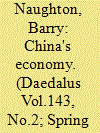

|
|
|
|
|
| Publication |
2014.
|
| Summary/Abstract |
China's economic success has bred a new complacency and resistance to change. This in turn has created a credibility crisis, as many Chinese citizens believe the opposition of vested interests makes reform impossible. However, proponents of economic reform argue that the current economic strategy is unsustainable. They point to reform backsliding, overinvestment, and financial fragility as problems that will collide with an inevitable economic slowdown caused by rapid demographic changes, and that will potentially cause economic and political crisis. Renewed economic reform is thus the only prudent and viable choice. The November 2013 Third Plenum shows that China's leaders have tentatively accepted the need for reform.
|
|
|
|
|
|
|
|
|
|
|
|
|
|
|
|
| 3 |
ID:
130404
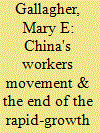

|
|
|
|
|
| Publication |
2014.
|
| Summary/Abstract |
China's rapid economic growth period was predicated on a development model that exploited the stark divide between its urban and rural citizens. As the workshop of the world, Chinese factories tapped the vast surplus labor of the countryside. Rural workers' expectations were low, but their desire for new employment opportunities was boundless and their numbers seemed limitless. Three decades later, these conditions have changed: workers' expectations are higher and their numbers are diminishing as the population ages. Labor disputes and strikes are endemic as the expectations and aspirations of workers outpace the nation's slowing growth rate. Compared to the anemic labor movements in the West, China's workers are emboldened, though they are still hampered by a repressive political environment and strict constraints on freedom of association. Conflict is spontaneous and settlement is ad-hoc. Like many authoritarian regimes, the Chinese Communist Party has difficulty committing to the institutionalization of labor conflict as it heightens the possibility of social empowerment. The state remains in charge, which also means that labor-capital conflict almost invariably metastasizes into a confrontation between workers and the state.
|
|
|
|
|
|
|
|
|
|
|
|
|
|
|
|
| 4 |
ID:
130460


|
|
|
|
|
| Publication |
2014.
|
| Summary/Abstract |
One can find in any airport kiosk books that proclaim ours to be "the Chinese century." We have titles such as "The Dragon Awakes," "China's Rise," "The Rise of China," and "China's Ascent," to name but a few. But to rise is not necessarily to lead. What constitutes leadership? In higher education, China is building the fastest growing system-in quality as well as in quantity-in the world. The foremost global powers of the past four centuries all offered models in the realms of culture, ideas, and education. This may be said of seventeenth-century France under Louis XIV; of the Qing during the Qianlong reign of the eighteenth century; of Britain and Germany in the nineteenth century; and of the United States in the twentieth. China now aspires to educate global elites. For the twenty-first century, then, are Chinese universities poised for global leadership?
|
|
|
|
|
|
|
|
|
|
|
|
|
|
|
|
| 5 |
ID:
130400
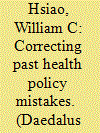

|
|
|
|
|
| Publication |
2014.
|
| Summary/Abstract |
China's health policy in the 1980s followed its economic policy of marketization. China shifted health financing from public to private and commercialized the country's public health services. Unwittingly, the Chinese government did not grasp the serious market failures in health care, which resulted in a profit-driven public health service in which patients pay directly for services. China's health policy created three major unintended consequences: disparity between rural and urban residents, poor quality of health care, and rapid inflation in health expenditures. Since 2003, China has tried to correct its policy mistakes through public financing and by establishing social health insurance. However, strong profit motives have become embedded within the culture of medical professionals and have eroded the professional ethics that prioritize medical practices for patients' benefits. Restoring medical ethics is a formidable challenge. This paper analyzes the transformation of the Chinese health system and its ongoing challenges.
|
|
|
|
|
|
|
|
|
|
|
|
|
|
|
|
| 6 |
ID:
130391
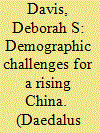

|
|
|
|
|
| Publication |
2014.
|
| Summary/Abstract |
Looking into the near future, China faces immense demographic challenges. Prolonged sub-replacement fertility has created irreversible conditions for rapid aging of the population, and massive migration to cities has left many villages populated by elderly farmers with no adult children to support them. Soaring divorce rates and high levels of residential dislocation have eroded family stability. To a large extent, government policies created to accelerate economic growth inadvertently fostered these demographic challenges, and now the country is facing the negative consequences of interventions that previously spurred double-digit growth. Legacies of Confucian familism initially blunted pressures on families. Filial sons and daughters sent back remittances, parents cared for migrants' children and invested in their children's marriages, and families with four grandparents, two parents, and one child (4+2+1) pooled resources to continuously improve a family's material well-being. But now the demographic challenges have further intensified and the question arises: can the state adopt new policies that will allow the prototypical 4+2+1 families created by the one-child policy to thrive through 2030?
|
|
|
|
|
|
|
|
|
|
|
|
|
|
|
|
| 7 |
ID:
130498
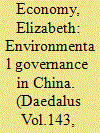

|
|
|
|
|
| Publication |
2014.
|
| Summary/Abstract |
After three decades of rapid economic growth, environmental degradation is now one of the most significant issues facing the Chinese government. The country's air, water, and land are all heavily polluted. Despite a number of environmental protection initiatives, both at the national and local levels, China ranks poorly when compared with other emerging nations. Formal government institutions have failed to address adequately the people's concerns. Beijing's system of decentralized authoritarianism lacks the political processes and incentives needed to implement meaningful national reform and to encourage local governments and polluting factories to enforce laws and regulations. The Chinese government now faces growing pressure from civil society, as NGOs, Internet activism, and protests compel the government to proactively address environmental issues. Beijing would do well to increase engagement between the government and its citizens, rather than relying on its current crisis management style of environmental governance.
|
|
|
|
|
|
|
|
|
|
|
|
|
|
|
|
| 8 |
ID:
130428


|
|
|
|
|
| Publication |
2014.
|
| Summary/Abstract |
The history of Internet activism and Internet control in China is one of mutual adaptation between citizen activists and party authorities. The party-state initially reacted to Internet activism with alarm, but has since built a comprehensive approach combining repressive policing with gentler methods of social management. This approach has evolved in response to the diverse forms of and participants in Internet activism. But the adaptability of the Chinese Internet control regime does not mean that it will root out Internet activism. On the contrary, Internet activism will continue to grow and will itself adapt to the changing forms of control. Comparisons with Russia and the United States highlight how political economy, history, and everyday practice shape the forms of Internet activism and control.
|
|
|
|
|
|
|
|
|
|
|
|
|
|
|
|
| 9 |
ID:
130423


|
|
|
|
|
| Publication |
2014.
|
| Summary/Abstract |
In the 1980s and 1990s, China devoted extensive resources to constructing a legal system, in part in the belief that legal institutions would enhance both stability and regime legitimacy. Why, then, did China's leadership retreat from using law when faced with perceived increases in protests, citizen complaints, and social discontent in the 2000s? This law-stability paradox suggests that party-state leaders do not trust legal institutions to play primary roles in addressing many of the most complex issues resulting from China's rapid social transformation. This signifies a retreat not only from legal reform, but also from the rule-based model of authoritarian governance that has contributed much to the resilience of the Chinese system. The law-stability paradox also highlights the difficulties facing efforts by China's new leadership to reinvigorate legal reform.
|
|
|
|
|
|
|
|
|
|
|
|
|
|
|
|
| 10 |
ID:
130486
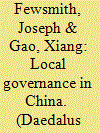

|
|
|
|
|
| Publication |
2014.
|
| Summary/Abstract |
China faces major challenges from social instability and general societal disaffection, which have continued to grow even as the economy has developed. In recent years, the Chinese government has tried to address such issues by diverting increasing resources to raising the income of villagers and providing social services to the urban and rural population alike. So why have "mass incidents"-public protests that sometimes turn violent-continued unabated? This article argues that the structure of central-local relations leads local governments to discount the interests of residents on the one hand, and distort central policies to the benefit of the local government on the other. The "party manages the cadres" principle, through which the central government exerts vertical control, prevents horizontal and bottom-up accountability, and thus ends up setting the interests of local cadres against those of local residents. The central government's interest in preserving its own power makes it reluctant to reform the central-local relationship, thus perpetuating crises.
|
|
|
|
|
|
|
|
|
|
|
|
|
|
|
|
| 11 |
ID:
130450
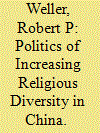

|
|
|
|
|
| Publication |
2014.
|
| Summary/Abstract |
China has seen a remarkable growth and pluralization of religious activity over the past thirty years, a development that has rapidly overtaken the incremental and sluggish changes in the relevant regulatory structures. In much of the country, the government has managed the mismatch between religious practice and official rules by governing with "one eye open and one eye closed," that is, by pretending not to notice violations of the regulations as long as people pretend that they are following the rules. Comparative evidence suggests that such a mode of governance can be long-lasting and effective by encouraging groups to self-censor, by allowing space for contextual experimentation, and by stressing the acceptance of nominal convention over the control of behavior. This situation is likely to continue unless China adopts a new vision of the desired relation between state and society.
|
|
|
|
|
|
|
|
|
|
|
|
|
|
|
|
| 12 |
ID:
130395


|
|
|
|
|
| Publication |
2014.
|
| Summary/Abstract |
Despite repeated pledges by China's leaders to reduce the gap between rich and poor, income inequality has continued to rise. China's Gini coefficient, a standard measure of income inequality, was higher in 2007 than in the United States, Russia, or most other societies. Why have China's income gaps increased so fast and so far, despite programs designed to promote greater equality? Standard explanations, such as income gaps inevitably rising with rapid economic development or in a post-socialist transition, cannot explain the Chinese case. Paradoxically, the sharp rise in inequality is driven more by the legacy of China's socialist system than by market forces or the global economy. It will not be possible to bring China's soaring income gaps under control unless the new leaders who took power in 2012-2013 are able to make much more fundamental reforms than have been attempted to date.
|
|
|
|
|
|
|
|
|
|
|
|
|
|
|
|
| 13 |
ID:
130446
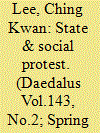

|
|
|
|
|
| Publication |
2014.
|
| Summary/Abstract |
This essay sketches an array of cultural, political, and bureaucratic mechanisms that mediate the Chinese Communist state's relationship with the major types of social protests, in the process exploring how governance and contention have transformed each other in the past six decades. In particular, it spotlights a noteworthy development in recent years: the increasingly salient market nexus between state and protest. While the regime response of making economic concessions to protesters is hardly unique in the context of China's own past, the transition from top-down mandated concession to pervasive bargaining between the state and protesters is a significant break with past patterns. The negotiability of cash and material rewards insinuates a market logic of governance that is made all the more poignant by the singularly formidable fiscal and infrastructural capacities of the current Chinese regime among its authoritarian counterparts worldwide.
|
|
|
|
|
|
|
|
|
|
|
|
|
|
|
|
| 14 |
ID:
130402


|
|
|
|
|
| Publication |
2014.
|
| Summary/Abstract |
After rapid changes in social policy and increases in social expenditures over the past five years, many of the uniformly negative assessments of China's record on health care, retirement pensions, and other forms of social security have to be reconsidered. This article examines the rapid expansion in social policy coverage and spending, and considers the possible significance of these changes for Chinese politics. The administrative and territorial categories that have defined access to social welfare provision over the history of the People's Republic of China have not yet receded, but their significance has diminished with programs that create uniform eligibility across rural and urban categories of citizenship. Large gaps in benefits remain, and are likely to generate political demands in the future as urbanization continues to erode the administrative distinctions between urban and rural.
|
|
|
|
|
|
|
|
|
|
|
|
|
|
|
|
|
|
|
|
|